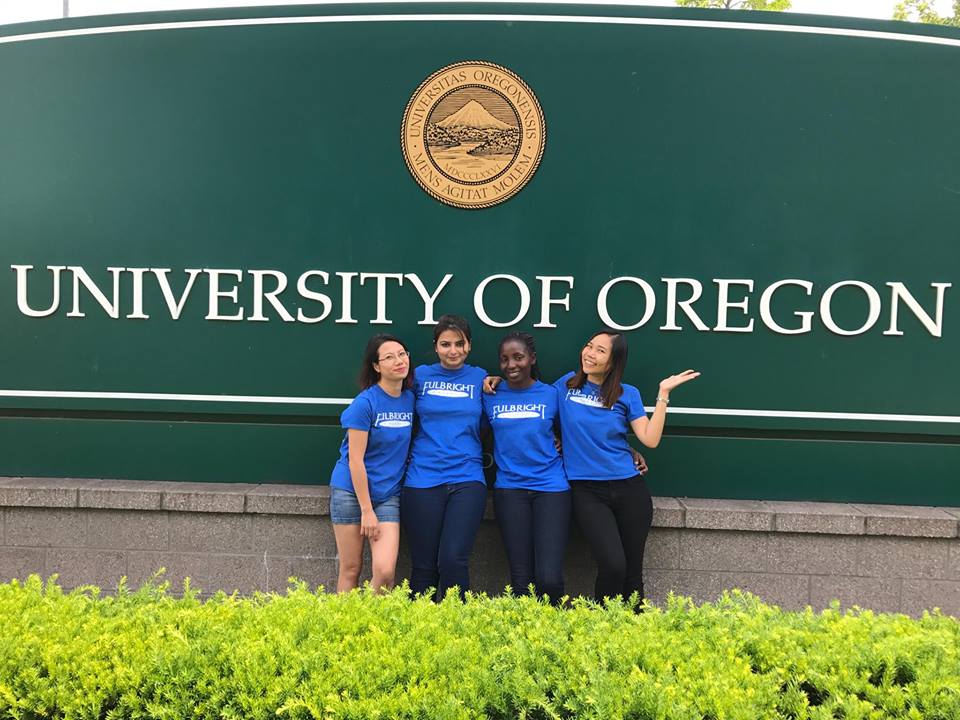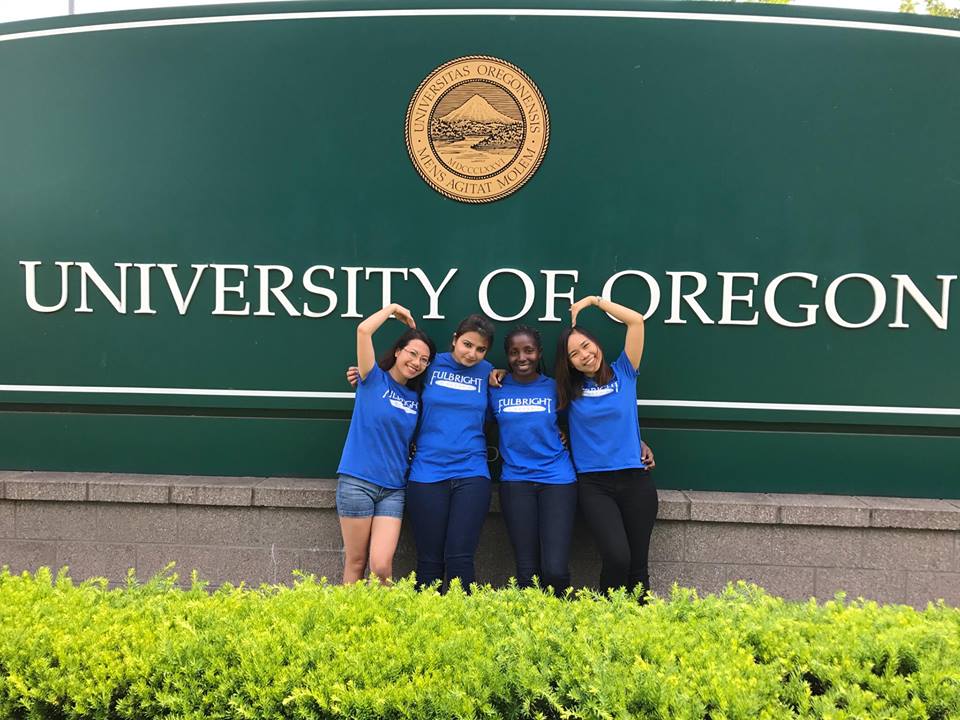Student Spotlight – 2016-2017 Fulbright Scholars

From Left to Right: Duong Hong Anh, Kainat Shaikh, Irene Njenga, Suparada Eak-in
This end-of-term Student Spotlight is a special “goodbye” to our dear friends, colleagues, and classmates from the Fulbright Foreign Language Teaching Assistant Program. The Yamada Language Center at the University of Oregon has hosted these four lovely language teachers throughout the 2016-2017 school year, and the LTS cohort has had the wonderful opportunity to study along side them in the various Language Teaching courses they participated in. The YLC has been proud to welcome the FLTA’s without whom 4 of the 8 Self Study Program languages would not be available to the UO students and community. Now that Spring term is over, each scholar will soon be heading back to her home country, and the LTS program would like to recognize and remember the wonderful experiences we got to share with them!
Tell us about yourselves! Where are you from? What kind of work have you done? Any hobbies?
Anh:
I am Anh Duong. I come from Hanoi, the capital city of Vietnam. I am an English instructor at the University of Languages and International Studies back in my home country. I was granted the Fulbright scholarship last year and came to UO to study and work as an FLTA. About my personal life; I love music, movies, traveling, reading, and taking pictures. Since I came here, I have taken up cubing, basketball, and playing the guitar as my new hobbies.
Kainat:
I am from Hyderabad, Sindh, Pakistan. I work at the National University of Modern Languages (NUML), so currently I am on leave as I am availing the Fulbright Fellowship. I teach graduates and undergraduates majoring in English Literature and Linguistics. I like reading books, and writing critical reviews. I enjoy traveling, especially to the places which have had a rich history.
Irene:
My name is Irene Njenga, and I am from the central region of Kenya. I have a Bachelor’s Degree in Linguistics and a Master’s in Education, both from the University of Nairobi. Before coming to UO, I had worked in two places. My first job was at Dadaab Refugee Camp (Kenya) as the officer in-charge of the Accelerated Learning Program, and my second job was as an English teacher at Mukurwe High School (Kenya). I enjoy traveling and socializing with people from different cultures because it opens my mind to new ways of thinking and stimulates my creative problem-solving skills. I also enjoy swimming, cooking, reading novels, listening to music and watching movies.
Suparada:
My name is Suparada Eak-in. I am from Thailand. Back in Thailand, I worked as a lecturer of English in the Department of English and as a Deputy Director of the International Office at Mahanakorn University of Technology. My specialization is Teaching English as a Foreign Language and Teaching English for Specific Purposes. I taught EAP and ESP to non-English majors including Engineering, IT and Business students. In my free time, I like learning new languages, doing art and working out. Now, I am learning four languages: Korean, Japanese, Chinese and Vietnamese by myself. I also draw and take pictures. My favorite exercises are jogging, Thai boxing and yoga.
Tell us about teaching at the UO as an FLTA! What is that like?
Anh:
One of my key missions in the US is to teach Vietnamese to both students at UO and community members at the YLC. I appreciate the chance to teach my native language and share Vietnamese culture with American people as well as heritage students. Thanks to the Self Study Program at YLC, with small-size classes but extensive interaction with students, I have precious opportunities to listen to many individual stories, enabling better understanding of American culture as well as my own culture.
Kainat:
The YLC is the place to grow professionally, interdependently and culturally. I never taught Hindi/Urdu before coming to US, though it is the national language of Pakistan. I, being a native speaker, learned a lot about my culture, language and country by staying oceans away and that’s not only remarkable but a kind of liberating feeling.
Although I have been teaching for one year before becoming part of YLC, participating in the program has provided me an insight to see language teaching not as a way to show how languages are different from one another, but as a platform to let me explore how languages all around the world are spoken in their natural, cultural and raw forms. So, in order to completely imbibe in this language teaching experience, I myself decided to learn a new language. I attended classes of Turkish. New language gives a new lens to view the world. As such it may seem that speaking different languages actually makes us different from one another but actually learning a new language makes one feel connected to the wider community which is not one’s own. In one place, where creating borders may divide us, but learning new languages can unite us, this is my takeaway from YLC.
Irene:
Swahili is one of the easiest languages to learn! Although a biased view, it is true that Swahili is not a tonal language, has a fixed stress pattern, and words are spelled exactly how they are pronounced i.e. no silent letters! Teaching Swahili at the UO has been very rewarding. It has also been a great opportunity to interact with new cultures and incorporate Swahili culture into language teaching. I believe that my students enjoyed the lessons and gained competence in using the language. This has also helped me refine my teaching skills and familiarity with using the communicative approach in teaching grammar. I never discussed grammar in a tabular form and very rarely used grammar technical terminology.
Suparada:
Teaching Thai at YLC is different from teaching English at my university in Thailand. Firstly, YLC classes are small with no more than fifteen students. This provides me the opportunity to get to know my students more so I can facilitate their language learning more properly. Moreover, YLC offers the Self Study Program which places emphasis on the students’ needs. The challenge is to compromise/balance students’ individual needs and prepare the lessons to serve their needs efficiently. Lecture-based and commercial textbooks seem not to correspond with YLC students’ learning styles and goals. Thus, I mainly implemented a theme-based method in my classes. I set the themes according to the students’ needs and designed interactive activities to engage students in learning. I found that the students enjoyed learning and improved their skills proficiently.
What classes did you take during your time at UO? Did you have any other projects that you worked on? What was the most valuable thing you’ve gained from your experience here?
Anh:
Apart from teaching Vietnamese, I also attended some classes, two of which were Teaching English Culture and Literature, and Testing and Assessment in the LTS Program. The most significant thing I took from these classes is the inspiration from my professors and classmates. I especially enjoy the lively and thought-provoking discussions with different points of view and practical projects in teaching that will benefit my own teaching in the future.
Kainat:
I enrolled myself in three courses, one course per term. My grant with Fulbright ensures that I grow strong academically by taking the classes that can serve my long term goals. Therefore, I took classes in LTS all three terms; Teaching Culture & Literature in Language Classrooms, Teaching Pronunciation, & Teaching and Assessment. My time with LTS cohort is worth treasuring as I met intelligent and creative people from various parts of the world.
I am also part of International Cultural Service Program (ICSP). I presented all around Eugene in different high schools, facility centers, care systems, and at UO as well, as the cultural ambassador of Pakistan.
From my entire year at UO, the most valuable asset that I have gained is to challenge the limits, and to outrun them.
Irene:
I took classes in Language Teaching and International Studies. I worked on various projects like incorporating literature into English language teaching, education and culture in Kenya, as well as creating direct types of assessment. The most valuable thing I have gained is that language teaching can be fun. I have learned how to use different scaffolding activities in teaching language, classroom management techniques, key assessment principles, and skills in creating and/or adopting assessment tools and procedures for the language classroom.
Suparada:
I took two classes in LTS and one class in Linguistics. The classes in both programs provided me knowledge that I can apply in my teaching career. My favorite class was Teaching Pronunciation, which I took last term. I like this class most because I did not only learn the contents but also had opportunities to practice. Besides, I like observing the techniques that Dr. Patricia Pashby used in class. I found those techniques useful and worked well with my students.
Apart from teaching and learning, I worked as a cultural ambassador in the ICSP at UO. I presented Thailand and Thai culture to school students and senior communities in Eugene. It is a great opportunity to meet and talk with local people outside of the university and have productive cultural exchanges.
Any plans for the future, or final thoughts you would like to share?
Anh:
My gratitude goes to the Fulbright program for giving me a chance to come to the US, meet amazing people, and share my story.
Kainat:
When I go back to Pakistan, I will resume my teaching, but there will be entirely different teaching methodologies. I will be working on making classes more student-centered where students should take responsibility of their learning. I learned a lot about testing and assessment this last term, and it has completely changed my perception towards language teaching. I am really looking forward to using the new teaching and testing trends which can ensure learning for not just a fleeting moment but for a life-time.
Irene leaves us with her favorite quote:
“If you can’t fly then run, if you can’t run then walk, if you can’t walk then crawl, but whatever you do you have to keep moving forward.” Martin Luther King Jr.
I believe that despite the obstacles we face when pursuing our dreams, we should always be focused and keep working to realize them.
Suparada:
All of these experiences make me eager to go back and share them with my colleagues and students back home. I also want to better develop teaching methodology and education in my home country.

Safe travels home!
